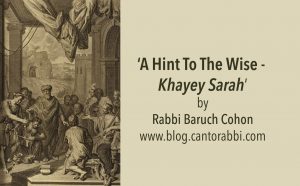A HINT TO THE WISE – Khayey Sarah – Gen.23:1 – 25:18, by Rabbi Baruch Cohon
Many and various comments circulate about this week’s reading. Called Khayey Sarah – “The life of Sarah” – it starts, not with the life of Sarah but with her death. Says the Torah, she lived “100 years, and 20 years and 7 years.” Why not just say 127 years? Because, says Rashi’s classic commentary, we learn hereby that she was as innocent at the age of 100 as she was at 20 (since Heavenly punishment is not meted before age 20), and as beautiful at 20 as she was at 7. In fact, she is the only woman whose age is recounted in the Torah. The mother of our people, she gave her name to countless girls of many nations ever since.
Final rites for someone as important as Sarah occupy a good section of this reading. Abraham owns no land. He needs to secure a gravesite. And to do so, he goes to Hebron and negotiates with the Hittites. The corner of the field he wants belongs to a man named Ephron. It contains the Cave of Machpelah, a dignified and appropriate gravesite. That cave is still a sacred location and burial place today. Our enemies destroyed the roadside graves of Rachel and Joseph. But they took over Machpelah. As far as we know, our patriarchs and our other matriarchs still lie there. But visiting that site now requires special arrangements.
Our reading this week takes us to the day this cave was acquired. We witness Abraham and Ephron negotiating over the purchase.
Now this is the Middle East, and Abraham and Ephron are both described as economically successful. What kind of bargain will they strike? We know Abraham can bargain. He even bargained with the Almighty over the fate of Sodom and Gomorrah. How will he approach this deal?
He goes to the tribal chiefs, presumably assembled at the gate of the city. There he represents himself as a stranger and sojourner among the Hittites. He asks their understanding of his need to bury his wife. And he offers to buy a gravesite for cash. The tribal chiefs reply with flattery. They call him a prince, and invite him to select the choicest of their burial sites, free of charge. He insists that he will pay to purchase the land, and asks for a corner of Ephron’s field. For the full price.
At this point Ephron speaks up. “No, my lord, hear me out. I give you the field and the cave that is in it. In the sight of my people I give it to you. Bury your dead.”
This causes Abraham to rise and bow before the am ha-aretz, the people of the land. Again he declares he will pay for the field.
Ephron answers: “Listen, my lord. A piece of land worth 400 shekels – what is that between you and me? Bury your dead.”
The next sentence is, in more ways than one, the payoff. “Abraham heard Ephron.” And here we see Abraham the bargainer weighing out 400 shekels of silver, oveir lasokheir – merchants’ standard, acceptable tender. He doesn’t even offer 350, even though the “piece of land” is hardly worth the asking price. As the Hertz commentary points out, the contemporary Code of Hammurabi set the annual wages of a working man at 6 to 8 shekels, a long way from 400. All the high-toned Hittite declarations of respect and sympathy and generosity – forgotten. Pay up.
Of all the commentaries on this reading, perhaps the most telling is a 3-word statement by the Rashbam: Dai lakhakima bir’miza –“ To the wise, a hint is enough.” I heard you, Ephron; you said 400, right? Hold out your hand…



